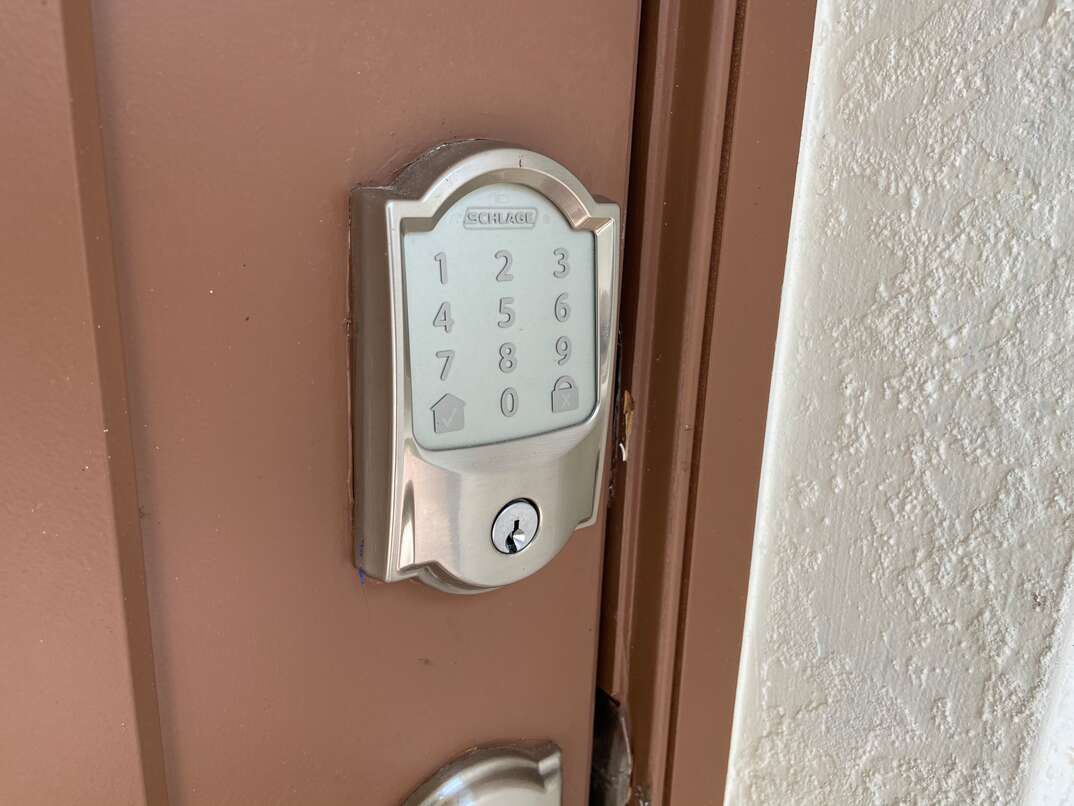Are Keyless Entry Systems Safe?

If you’ve ever found yourself locked out of your house in the middle of winter — perhaps wearing only your pajamas (Just us?) — a keyless entry system may seem like a dream come true.
But, before you call a locksmith to install a high-tech keyless lock, it’s helpful to understand how its security profile compares to a traditional lock. Here’s what you should know.
What Is a Keyless Entry System?
Residential keyless entry systems let you lock and unlock your home without a key. Depending on the type of system you choose, these keyless locks may operate using a numeric code, phone app or biometric sensor, which identifies a user based on a fingerprint or other unique physical attribute. Smart locks, which integrate with your digital home network, also use Wi-Fi, Z-Wave or Bluetooth technology.
When compared to a typical dead bolt, keyless locks have advantages and disadvantages. On the plus side, a keyless entry system can be a secure option for locking your home for several important reasons:
- They’re simple to lock and may even lock automatically, so family members are less likely to leave the door unlocked when leaving the house.
- They can’t be picked.
- You can engage them remotely if you forget to lock up when leaving the house.
- You don't have to hide a key beneath a doormat or in a flowerpot, where it's easy for would-be intruders to find.
- You can issue temporary codes to house sitters and visitors, so you don't have to make copies of your keys, which can get lost or stolen.
- You can request notifications when someone enters (or tries to enter) your home.
By permitting keyless access, electronic locks also offer additional peace of mind for families with young children, elder members or pets. With keyless entry, parents can let themselves back in if they get locked out by a young child. They can also remotely grant access to neighbors or first responders if an emergency occurs. Additionally, door codes or biometric information may be changed if you want to deny someone access to your home.
However, keyless entry systems have a weakness dead bolts don’t have — technology. If you lose your phone and it doesn't have a secure passcode, an intruder can potentially gain access to your entry system app and, consequently, your house. An easy-to-guess passcode, such as your birthdate, can also make it easy for an intruder to get in. If your system uses a numerical door code, even wear on the buttons can help thieves quickly guess your access code.
Can Keyless Locks Be Hacked?
Unfortunately, keyless locks can be hacked. Many electronic entry systems connect to a user’s home network and can be infiltrated using easy-to-find hacking devices. Hackers may also get in via your digital assistant or phone or by using information found easily on the internet.
However, you can reduce the risk of someone hacking your keyless locks by:
- Creating strong passwords for your modem, router and digital home assistant
- Changing your network passwords and door codes regularly
- Updating your door codes or biometric access when a visitor no longer needs them
- Installing the latest firmware updates on your devices to minimize digital security gaps
- Logging out of smart home apps when you aren’t using them
- Using two-factor authentication for apps
- Upgrading routers and modems to newer, safer models
More Related Articles:
- 8 Benefits of Installing Smart Locks
- Here’s How Much a Locksmith Charges for 5 of the Most Common Services
- Lose Your Keys Often? Here's How to Prevent Lockouts
- Installing a New Deadbolt? Here's Everything You Need to Know
- What Is Rekeying a Lock?
Are There Other Safety Risks With Electronic, Keyless Systems?
A high-quality electronic entry system can be a safe, easy way to secure your home. However, there are several other safety risks you should consider before deciding to go keyless:
- Lockouts: Keyless locks require electricity (and often internet access) to operate, so a power outage or battery failure can leave you locked out of your home.
- Battery replacement: Some electronic locks are powered by batteries, so you'll need to replace them regularly.
- Forgotten codes: If your lock requires a multi-digit door code, you'll need to remember it. If you're prone to forgetting codes, you may find yourself locked out.
Some electronic locks have a traditional lock-and-key backup for these contingencies. However, by choosing a system with a backup key, you'll have the same inconveniences — and potential security risks — that come with a traditional dead bolt.
Elocal Editorial Content is for educational and entertainment purposes only. Editorial Content should not be used as a substitute for advice from a licensed professional in your state reviewing your issue. Systems, equipment, issues and circumstances vary. Follow the manufacturer's safety precautions. The opinions, beliefs and viewpoints expressed by the eLocal Editorial Team and other third-party content providers do not necessarily reflect the opinions, beliefs and viewpoints of eLocal or its affiliate companies. Use of the Blog is subject to the
Website Terms and Conditions.The eLocal Editorial Team operates independently of eLocal USA's marketing and sales decisions.



